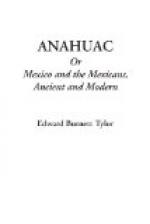Having no business to do, the counting-house would probably take stock, and balance the books; but when this is finished there is little to be done but to practice pistol-shooting and hold tournaments in the court-yard, and to teach the horses to rayar; while the head of the house sits moodily smoking in his arm-chair, reckoning up how many of his debtors would be ruined, and wondering whether the loaded mules with his goods had got into shelter, or had been seized by one party or the other.
At last the revolution is over. The new president is inaugurated with pompous speeches. The newspapers announce that now the glorious reign of justice, order, and prosperity has begun at last. If the millennium had come, they could not make much more talk about it. Our unfortunate friend, coming out of his den only to hear dismal news of runaway debtors and confiscated bales, has to illuminate his house, and set to getting his affairs into something like order again.
Since we left the country things have got even worse. Formerly, all that the foreign merchants had to suffer were the incidental miseries of a state of civil war. Now, the revolutionary leaders put them in prison; and, if threats are not sufficient, they get forced loans out of them, much as King John did out of his Jews.
Even in times of peace, foreign goods must be dear in Mexico. In a country where they have to be carried nearly three hundred miles on mules’ backs, and where credit is so long that the merchant can never hope to see his money again in less than two years, he cannot be expected to sell very cheaply. But the continual revolutions and the insecurity of property make things far worse, and one almost wonders how foreign trade can go on at all.
One of our friends in Mexico had three or four hundred mules coming up the country laden with American cotton for his mill, just when Haro’s revolution began. He got off much better than most people, however; for, greatly to the disgust of the legitimate authorities, he went down into the enemy’s camp, and gave the revolutionary chief a dollar a bale to let them go.
As may be supposed, commercial transactions have often very curious features here. Strange things happen in the eastern states; but people there say that they are nothing to the doings on the Pacific coast, where the merchants get up a revolution when their ships appear in the offing, and turn out the Custom-house officers, who do not enter upon their functions again until the rich cargos have started for the interior.
One little incident, which happened—–I think—at Vera Cruz, rather amused us. When the Government is hard-up, a favourite way of raising ready money is to sell—of course at a very low price—orders upon the Custom-house, to pass certain quantities of goods, duty-free. Such a transaction as this was concluded between the Minister of Finance and a merchant’s house who gave hard dollars in exchange for an order to pass




